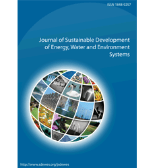
Journal of Sustainable Development of Energy Water and Environment Systems-JSDEWES
Scope & Guideline
Empowering Research for a Sustainable Tomorrow
Introduction
Aims and Scopes
- Sustainable Energy Systems:
Research that explores innovative and sustainable methods for energy production, including renewable energy technologies, energy efficiency improvements, and energy management systems. - Water Resource Management:
Studies focusing on the sustainable management of water resources, including treatment technologies, conservation strategies, and the impact of climate change on water supply. - Environmental Impact Assessment:
Analyses assessing the environmental effects of various technologies and practices, with an emphasis on life cycle assessments and sustainability indicators. - Interdisciplinary Approaches to Sustainability:
Research that integrates concepts from multiple disciplines to address complex sustainability challenges, particularly in the energy-water nexus and circular economy. - Innovative Technology Development:
Development and evaluation of new technologies aimed at enhancing sustainability in energy and water systems, including smart grids, waste-to-energy processes, and advanced materials.
Trending and Emerging
- Energy-Water Nexus:
Research exploring the interdependencies between energy and water systems is gaining momentum, emphasizing the need for integrated management strategies to enhance sustainability. - Climate Change Mitigation Strategies:
Increasing focus on studies that evaluate the health and environmental co-benefits of climate change mitigation efforts, reflecting a growing awareness of the interconnectedness of these issues. - Smart Technologies and Digital Solutions:
Emerging themes include the use of smart technologies and digital solutions for energy management, such as smart grids and IoT applications in water management. - Circular Economy Practices:
A significant trend towards research that supports circular economy principles, promoting waste reduction, resource recovery, and sustainable material management. - Community-Based Approaches:
An increase in studies examining community-driven initiatives for sustainable energy and water management, highlighting local engagement and participatory governance as key factors.
Declining or Waning
- Traditional Fossil Fuel Technologies:
Research focused on traditional fossil fuel technologies has become less frequent as emphasis shifts towards renewable energy and sustainable practices. - Basic Water Quality Studies:
While water quality remains important, studies that do not incorporate innovative treatment technologies or sustainability assessments are appearing less frequently. - Single-Domain Studies:
There is a noted decline in research that focuses solely on energy or water without addressing the interconnections between these systems, reflecting a broader trend towards integrated approaches.
Similar Journals

Smart Grids and Sustainable Energy
Transforming the Future of Energy ManagementSmart Grids and Sustainable Energy, published by SPRINGER NATURE, is a pivotal open-access journal dedicated to advancing the knowledge and application of smart grid technologies and sustainable energy solutions. Serving as a key resource in the fields of Economics and Econometrics, Electrical and Electronic Engineering, and Energy Studies, this journal aims to facilitate interdisciplinary collaboration and innovation. With a commendable Q2 ranking in multiple categories as of 2023, including a top percentile placement in Economics and Econometrics and Electrical Engineering, the journal underscores its significance in driving forward research that combines economic viability with technological advancement. Researchers, professionals, and students will find a wealth of scholarly articles designed to expand understanding of the complex interplay between energy systems, sustainability, and economic factors. For those interested in cutting-edge research with high visibility due to its open-access policy, Smart Grids and Sustainable Energy is an essential addition to the academic landscape.
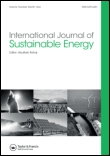
International Journal of Sustainable Energy
Driving Change with Open Access Energy ResearchInternational Journal of Sustainable Energy is a premier peer-reviewed journal published by TAYLOR & FRANCIS LTD that serves as a vital platform for the dissemination of innovative research in the field of sustainable energy. With an ISSN of 1478-6451 and an E-ISSN of 1478-646X, this journal has established a significant reputation, currently ranked in the Q2 category across multiple disciplines such as Energy (miscellaneous), Fluid Flow and Transfer Processes, and Fuel Technology, reflecting its commitment to high-quality academic contributions. The journal has been Open Access since 2022, ensuring that research is freely accessible to a global audience, fostering collaboration and knowledge sharing. Positioned in the United Kingdom, the journal strives to address the critical challenges surrounding renewable energy and sustainability, appealing to researchers, professionals, and students alike. The Scopus rankings further enhance its credibility, showcasing its impact in the field with notable percentiles across various energy-related categories. With converged years from 2003 to 2024, the International Journal of Sustainable Energy remains a cornerstone for innovative research that seeks to pave the way towards a more sustainable future.

Energy Nexus
Exploring the vital links between energy and ecology.Energy Nexus, published by Elsevier in the United Kingdom, is a leading academic journal dedicated to advancing the interdisciplinary understanding of energy and environmental science. With an impressive impact factor, the journal ranks in the Q1 category for both Energy (miscellaneous) and Environmental Science (miscellaneous) in 2023, positioning itself among the top-tier academic resources for researchers and professionals. Covering a wide spectrum of topics from renewable energy solutions to sustainable environmental practices, Energy Nexus aims to foster innovative research and provide a platform for the dissemination of groundbreaking ideas. The journal invites the submission of high-quality articles that explore the intricate connections between energy systems and environmental sustainability. By bridging gaps between different domains of study, it plays a crucial role in shaping the future of energy research while promoting practical applications for global challenges.
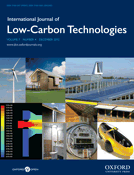
International Journal of Low-Carbon Technologies
Fueling the dialogue on resilient infrastructure and carbon reduction.International Journal of Low-Carbon Technologies is a premier, peer-reviewed publication dedicated to advancing the field of low-carbon technologies and sustainable practices. Published by OXFORD UNIVERSITY PRESS, this journal serves as a vital resource for researchers, professionals, and students alike, providing insightful research and innovative solutions for a sustainable future. With its ISSN 1748-1317 and E-ISSN 1748-1325, the journal is recognized globally, boasting an impressive impact in its categories, including a Q1 ranking in Architecture and Q2 rankings in both Civil and Structural Engineering and Environmental Science as of 2023. It is open access since 2014, facilitating the dissemination of knowledge to a wider audience, and encourages critical discourse on environmental sustainability across converging disciplines. The journal’s Scopus rankings reflecting its standing—ranked #23 in Architecture (88th percentile) and #130 in Civil and Structural Engineering—underscore its importance in driving forward the scientific agenda in low-carbon technologies. As we journey from 2007 towards 2024, the International Journal of Low-Carbon Technologies remains a cornerstone for research and dialogue in reducing carbon footprints and promoting resilient infrastructure.

Clean Technologies and Environmental Policy
Advancing sustainable solutions for a greener tomorrow.Clean Technologies and Environmental Policy is a prestigious journal published by Springer, dedicated to advancing the field of environmental science through the lens of sustainable technology and policy-making. Since its inception in 2004, the journal has carved out a significant niche within the academic community, boasting an impressive impact factor reflective of its quality, as evidenced by its ranking in the Q1 and Q2 categories across various disciplines, including Environmental Engineering and Business, Management and Accounting. With a focus on innovative approaches to managing environmental challenges, the journal covers a wide array of topics from management strategies in environmental engineering to methodologies in policy development. This comprehensive scope positions it as an essential resource for researchers, professionals, and students seeking to contribute to the dialogue on sustainable development and environmental stewardship. Although it operates without Open Access, the journal ensures rigorous peer review and timely publication of high-quality research, facilitating the dissemination of knowledge necessary for informed decision-making in the ever-evolving field of environmental science.
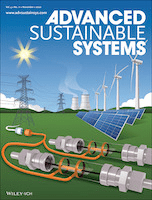
Advanced Sustainable Systems
Advancing Knowledge for a Resilient EarthAdvanced Sustainable Systems is a premier academic journal published by WILEY-V C H VERLAG GMBH, dedicated to the dynamic fields of environmental science and renewable energy. With an ISSN of 2366-7486, this journal has rapidly established its significance within the scientific community, achieving a prestigious Q1 ranking in both Environmental Science (miscellaneous) and Renewable Energy, Sustainability and the Environment categories as of 2023. Spanning the converged years from 2017 to 2024, it serves as a vital platform for researchers and practitioners alike, facilitating the dissemination of innovative ideas and groundbreaking research that drive sustainability initiatives globally. Although not an Open Access publication, its contributions are invaluable, reflected by its commendable Scopus rankings—#28 out of 233 in General Environmental Science and #49 out of 270 in Renewable Energy. As we face pressing environmental challenges, Advanced Sustainable Systems remains at the forefront, championing research that informs and influences sustainable practices and policies across the globe.
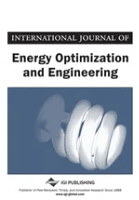
International Journal of Energy Optimization and Engineering
Innovating Tomorrow's Energy Optimization TodayThe International Journal of Energy Optimization and Engineering, published by IGI Global, is a leading platform dedicated to advancing the field of energy management and optimization. With its ISSN 2160-9500 and E-ISSN 2160-9543, this journal serves as an essential resource for researchers, professionals, and students interested in innovative strategies for energy efficiency and sustainability. Although it does not currently offer Open Access options, the journal is committed to high-quality peer-reviewed content that aims to address the pressing challenges of energy consumption, renewable resources, and optimization techniques in engineering applications. The significance of this journal in the evolving landscape of energy technologies makes it an invaluable source for those aspiring to contribute to the development of sustainable energy practices across the globe.
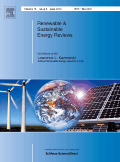
RENEWABLE & SUSTAINABLE ENERGY REVIEWS
Pioneering Research for a Sustainable WorldRENEWABLE & SUSTAINABLE ENERGY REVIEWS is a premier interdisciplinary journal published by Pergamon-Elsevier Science Ltd that focuses on cutting-edge research and reviews in the field of renewable energy and sustainability. With an esteemed impact factor, the journal stands out in Q1 category rankings for Renewable Energy, Sustainability, and the Environment, holding a remarkable rank of #7 out of 270 in Scopus with a 97th percentile rating. Since its inception in 1997, it has provided a vital platform for scholars and practitioners to disseminate knowledge, share innovative solutions, and discuss the technological advancements needed to foster a sustainable energy future. Although not currently offering open access, the journal ensures valuable insights are available to its audience, contributing enormously to the global discourse on renewable energy policy and practice. The journal is vital for anyone interested in the dynamics of sustainability in energy systems, as it bridges the gap between academia and practical application.

MRS Energy & Sustainability
Catalyzing Change in Energy Systems and SustainabilityMRS Energy & Sustainability is a premier interdisciplinary journal published by SpringerNature, focusing on advancing the understanding of energy systems and sustainability within the context of materials science and engineering. Since its inception in 2014, this journal has rapidly gained recognition in the academic landscape, achieving impressive rankings including Q1 in Electronic, Optical and Magnetic Materials and Mechanics of Materials, and Q2 in Energy Engineering and Power Technology as well as Renewable Energy, Sustainability and the Environment, as of 2023. The journal's ISSN is 2329-2229 and E-ISSN is 2329-2237. With a commitment to open access, it provides researchers and professionals with the latest findings and insights essential for guiding innovations in energy solutions and sustainable practices. The journal's global reach and high-impact reputation make it an invaluable resource for scientists, engineers, and policymakers dedicated to addressing the contemporary challenges of energy and sustainability. With a diverse scope and high Scopus rankings, MRS Energy & Sustainability continues to be at the forefront of research that shapes our energy future.
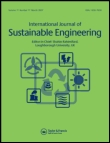
International Journal of Sustainable Engineering
Transforming challenges into sustainable engineering practices.Welcome to the International Journal of Sustainable Engineering, an esteemed publication within the field of engineering, dedicated to advancing the principles of sustainability in design and technology. Published by Taylor & Francis Ltd, this Open Access journal, available since 2022, provides a platform for high-quality research that addresses the challenges of sustainable engineering across diverse sectors. Based in the United Kingdom, the journal enjoys a distinguished reputation, reflected in its impressive Q1 status in the Engineering (miscellaneous) category and a notable Scopus rank of #35 out of 307, placing it in the top 88th percentile of its field. With a timeline of publications from 2008 to 2024, the International Journal of Sustainable Engineering serves as a vital resource for researchers, professionals, and students seeking to engage with innovative solutions that promote sustainability in engineering practices. We invite you to contribute to this critical discourse and explore the wealth of knowledge presented in our journal.